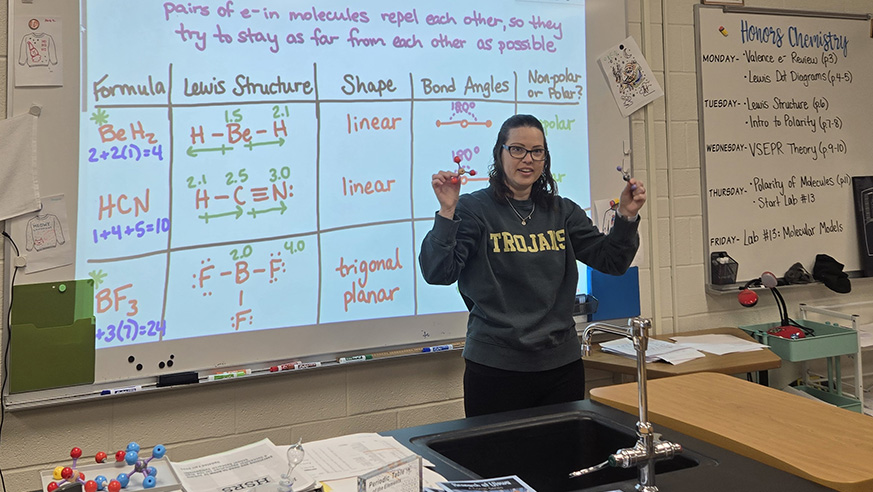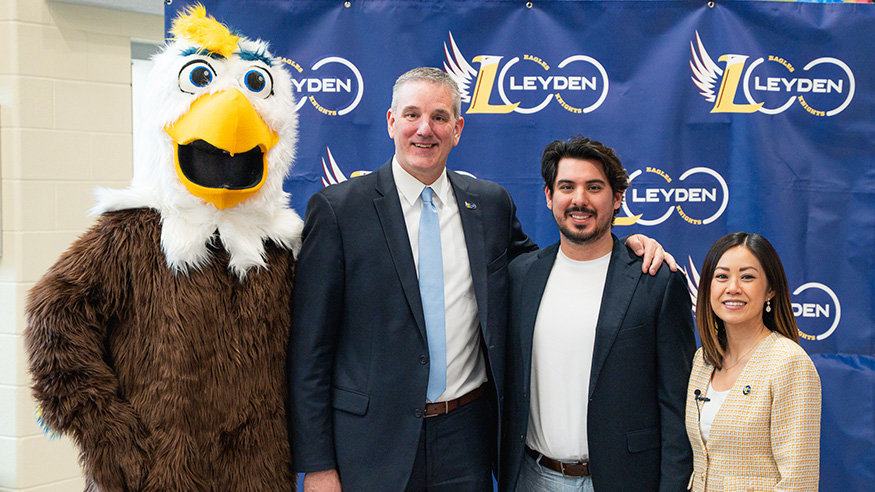Education
2025-26 catalog
JULIE DELANEY, Part-time Instructor
B.A., Iowa; M.S., Western Illinois; Ph.D., Nebraska
MICHAEL EGAN, Professor, Chair, Director of Elementary Education
B.S., Notre Dame; Ed.M., Harvard; Ph.D., Boston College
KATIE HANSON, Associate Professor, Director of Field Experiences, Secondary Education Clinical Coordinator
B.A., Luther; M.A., St. Mary's (Minnesota)
MICHELLE HINZMAN-Ferris, Assistant Professor
B.A., Clarke College; M.A., Northern Iowa; M.A., Iowa; Ed.S., Northern Iowa; Ph.D., Iowa
RACHEL LOCKART, Assistant Professor
B.A., Macalester College; M.A., Minnesota; Ph.D., Michigan State
MICHAEL SCARLETT, Professor, Director of Secondary Education
B.A., Macalester College; M.A., Ph.D., Minnesota
CHARLOTTE SHEPHERD, Professional Faculty
BSW, Western Illinois; MAT, Western Governors University
Entering the First Education Course
Admission to the first Education course, EDUC 301: Educational Psychology and Assessment.
Students may be enrolled in EDUC 301 when they have:
- Declared an education major or a minor in educational studies.
- Met with an education advisor to plan their schedule and discuss qualifications.
- Earned a minimum Augustana GPA of 2.75. Students with overall GPAs of 2.50-2.74 may be enrolled if space is available and they have had at least one term with a 2.75 + GPA. This GPA requirement does not apply to educational studies minors, but minors can only be enrolled in EDUC 301 if space is available.
- Earned an average grade of “B-” or higher in College Writing (FYI-101 or equivalent).This grade provision does not apply to educational studies minors.
Admission to the Teacher Education Program is by written application and is required for students to take any education program course beyond EDUC 301. Note: Grades lower than a C- or lower are not accepted by the State of Illinois in courses required for licensure. See your Education Department advisor for more information about this requirement. Successful applicants will meet these criteria:
- Earned an Augustana grade-point average (GPA) of 2.75.*
- Secured the signature of the major advisor of the field in which the student is preparing to teach.
- Secured the signature of the Education Department advisor.
- Earned a minimal average grade of "B-" in College Writing (FYI 101 or equivalent); earned a minimum grade of "B-" in EDUC 301. (For grades below B- see your Education advisor for remediation expectations).
*The minimum GPA requirement for standard admission to the Teacher Education Program is 2.75. Any student with a GPA in the 2.50- 2.74 range shall also be considered for provisional admission to the program providing that they:
1) Secure an oral or written statement of support from their academic advisor;
2) Earn a 2.75 in the term during which EDUC301 was taken; and,
3) If asked by the committee chair, meet with the Subcommittee on Admission to and Retention in Teacher Education and present a convincing case for their admission to the program.
Students dismissed from the Teacher Education Program because of GPA deficiencies will be required to wait a minimum of one term (not including J-Term) before reapplying to the program. Reapplication procedures will be monitored closely, taking individual student considerations into account. A student may be readmitted to the program only once. In order to be readmitted the student must secure a letter of support from their major advisor. If asked by the committee chair, the student may also be required to personally meet with the Subcommittee on Admission to and Retention in Teacher Education. At that particular meeting the student must present a convincing case for readmittance.
Admission to Student Teaching:
To be admitted to Student Teaching, candidates must:
1. Be admitted to and in good standing in the Teacher Education program.
2. Submit a completed application by the announced due date.
3. Earn prior to student teaching at least 24 semester hours in the first teaching field and 18 semester hours in any additional field in which student teaching is to be completed.
4. Have taken at least two courses (8 semester hours) at Augustana in the department in which the candidate is to earn the recommendation for licensure.
5. Receive the recommendation of the advisor(s) or chair(s) of the field(s) in which the candidate is preparing to teach.
6. Receive the recommendation of the Education Department advisor.
7. Complete all work from previous terms in which incomplete grades were received.
8. Complete all pre-student teaching field experiences as documented on the final evaluations and artifact summary forms for each clinical experience.
9. Have attempted the state content test for their primary teaching field (the area they are student teaching in) no later than July 15 of the summer prior to their student teaching term (both Fall and Spring student teachers).
10. Pass a fingerprint-based criminal history records check before their student teaching semester as required by the district.
The minimum Augustana GPA requirement for student teaching will be 2.75 unless the Subcommittee on Admission to and Retention in Teacher Education makes allowances for a student in the 2.50-2.74 range.
Grading for Student Teaching
P (Pass): A student receiving a Pass grade receives credit for the experience and is allowed to continue in the professional education sequence.
NR (Not Recommended): A student receiving a Not Recommended grade will not receive departmental recommendation for licensure but will receive college credit for the experience.
F (Fail): A student receiving a Fail grade does not receive credit for the experience and may not, except by petition, continue in the professional education sequence.
Recommendation for Licensure and Program Graduation
To be eligible for an Augustana College recommendation to the State of Illinois for licensure the student must have:
1. Satisfied all requirements of the Teacher Education Program.
2. Secured the recommendation of the chair(s) of the teaching field(s).
To be licensed in Illinois the student must have:
1. Met the standards established by the Illinois State Board of Education.
2. Secured the recommendation of the institution providing the preparation for teaching.
NOTE: Students completing all teacher education program requirements will be awarded an Augustana degree in an approved teacher education major. However, completion of a major and awarding of the degree do not guarantee licensure.
Provision for appeal of decisions: A decision by the Subcommittee on Admission to and Retention in Teacher Education may be appealed to the Teacher Education Committee. A decision by the Teacher Education Committee may be appealed to the Faculty. The student has the right to be represented by an attorney during the appeal process.
Education Major Extended Credit Program
To meet state licensure standards, Augustana students pursuing a major in an education field are eligible to participate in an annual extended credit program.
All Augustana students are allowed to take up to 34 credits each academic year under the Augustana tuition plan. Students who enroll in an education major are allowed to enroll in an additional four credits per year (38 total) with full time tuition with full time enrollment for two semesters (J-term credits included in tuition and J-term credits count toward the 38 for the year).
To participate in this program, students must:
- submit completed paperwork to declare a major in education no later than week six of spring semester in their first year;
- meet with their education advisor every term prior to registration;
- register within all published deadlines and continuously pursue coursework for their education major in order to maintain progress toward a degree;
Credits must be used within an academic year and do not roll over year to year. Students who exceed 38 credits, will be responsible for the associated overload fees. [Schedule of Student Charges] Students who do not meet the above criteria each year do not qualify for the additional credits.
MAJOR IN ELEMENTARY EDUCATION. A professional sequence consisting of 32 credits including EDUC-301, EDUC-340, EDUC-351, EDUC-352, EDUC-360, EDUC-360R, EDUC-364, EDUC-366, EDUC-366R, EDUC-391F, EDUC-391S, and EDUC-450. To be eligible for teacher licensure for grades 1-6 in Illinois the student must also successfully complete these 13 additional credits: EDUC-422 and INTR-EDA95. See your education department advisor for information regarding a minimum of 48 credits of supporting courses taught through other departments that are also required for licensure.
Reading Teacher Endorsement with ELEMENTARY EDUCATION MAJOR. Candidates have the option of including a Reading Teacher Endorsement as part of their undergraduate preparation. The additional 5 credits of coursework include: EDUC354, EDUC456, and EDUC456C. All 5 credits are taken in spring of the senior year after student teaching during the fall semester. Candidates must also successfully complete an additional licensure test given through the Illinois State Board of Education.
SECONDARY/PK12 EDUCATION PROGRAM. Teacher candidates in PK-12 and secondary education complete 38 credits of professional courses including Education EDUC-301, EDUC-310, EDUC-340, EDUC-370, EDUC-396, EDUC-397, EDUC-412, EDUC-422, EDUC-450,INTR- EDA9x (Student Teaching),and one of EDUC-381, EDUC-382, EDUC-383, EDUC-384, EDUC-386, EDUC-387. Exceptions apply to Music candidates. Teacher candidates in Art replace EDUC-396 or EDUC-397 with EDUC-395. Music requirements are listed under the Major in Music Education. See your Education Department Advisors for details. All teacher candidates must also complete an education content major in one of: Art, Biology, Chemistry, English, History, Mathematics, Music, Physics, French, or Spanish. See each department for information on its major requirements.
MIDDLE GRADES EDUCATION: MATHEMATICS. Teacher candidates majoring in Middle Grades (5-8) Mathematics complete 32 credits from the Secondary Education Program professional sequence and 28 credits of Mathematics content including: MATH 110, 120, 160, 220, 250, EDUC 280 and 384, and PSYC 240. Candidates who successfully complete the Mathematics for Secondary Education program (9-12) will also satisfy the Middle Grades Mathematics content requirements. See the Director of Secondary Education for more details.
MIDDLE GRADES EDUCATION: ENGLISH. Teacher candidates majoring in Middle Grades (5-8) English complete 32 credits from the Secondary Education Program professional sequence and 42 credits of language arts content which includes: ENGL 215, 260, 265, 210,310, and COMM 203; ENGL 250,327; one from ENGL 370, 375, 385; one from ENGL 270, 275, 278, 290, or 390; ENGL 350, 285, 345, or 295 or WGSS 230; an ENGL elective 300 or higher; and EDUC 382. Candidates can also earn licensure to teach English Language Arts in grades 9-12 by completing the major in English Education.
MIDDLE GRADES EDUCATION: SCIENCE. Teacher candidates majoring in Middle Grades (5-8) Science complete 32 credits from the Secondary Education Program professional sequence and 36 credits of science content which includes: BIOL 130 and 140; CHEM 131 and 132; PHYS 151 and 152; GEOG 105; GEOL 101; ASTR 145; and EDUC 386. Candidates can also earn licensure to teach Science in grades 9-12 by completing a major in Biology Education, Chemistry Education or Physics Education.
MIDDLE GRADES EDUCATION: SOCIAL SCIENCE. Teacher candidates majoring in Middle Grades (5-8) Social Science complete 32 credits from the Secondary Education Program professional sequence and 48 credits of social science content which includes: HIST 114,115, or 116;HIST 130 or 131; HIST 335, 340, 336, or 324; HIST 305 or 306;HIST 120, 121,123, 124, or 323; HIST 150 or 151; HIST 300; PSYC 100; GEOG 120 or 130; ECON 200;and EDUC 387. Candidates can also earn licensure to teach social science in grades 9-12 by completing a major in History Education.
ART EDUCATION SPECIALIST. 41 credits, including ART-101 or ART-102, ART-211, ART-228, ART-493 (1 credit), and ARHI-161; one 300 level or above ART or one 300 level or above ARHI; and one course from each of the following 5 categories—ART-342, ART-343, ART-343A, ARHI-374 or ARHI-372; ART-311, ART-302, ART-328, ART-331, ART-341, or ART-351; ART-123 or ART-124; ART-231 or ART-241; ART-252 or ART-261. See Director of Secondary Education for more details.
MAJOR IN BIOLOGY EDUCATION. 28 credits, including BIOL-130, BIOL-140, BIOL-250, BIOL-310, BIOL-343, One of BIOL-360 or BIOL-362, one of BIOL-386 or BIOL -387; and EDUC-422, EDUC-450 and INTR-EDA90 as part of the Secondary Education program. See the Director of Secondary Education for more details. Required supporting courses (28 credits): CHEM-131, CHEM132, PHYS-151, PHYS-152, ASTR-145, GEOG-105, GEOL-101.
MAJOR FOR CHEMISTRY EDUCATION. 28-32 credits, including CHEM-131 and CHEM-132 (can be replaced by CHEM 235); CHEM-321 and CHEM-322; CHEM-255, CHEM-441; one of CHEM-361 or CHEM-365; and CHEM-435. Required supporting courses (36 credits): ASTR-145; BIOL-130 and BIOL-140; PHYS-211 and PHYS-212 or PHYS-151 and PHYS-152; GEOL-101 and GEOG-105; and MATH-160, MATH-220 and MATH-230. See the Director of Secondary Education for more details.
MAJOR IN ENGLISH EDUCATION. 42 credits. 40 credits in English including 215, 260, 265, 210, 310; a Shakespeare class (250 or 327); two American literature classes (one from 370, 375, or 385 , and one from 270, 275, 278, 290, 390, or others pre-approved by the ELA advisor); a world literature class (285, 295, 345, 350 or WGSS 230); one elective ENGL (300 or higher) OR ENCW (200 or higher); plus two credits in Communication Studies (COMM 203 Listening). The English department allows the combination of EDUC422, EDUC450, and INTR-EDA90 to fulfill the English Senior Inquiry requirement. See the Director of Secondary Education for more information.
MAJOR IN HISTORY EDUCATION. 32 credits, distributed as follows: 4 credits from HIST130 or 131; 4 credits from HIST114, HIST115, or HIST116; HIST300; HIST305 or HIST306; 4 credits from a 300-level U.S. history course in a period other than the ones taken at the 100-level); 8 credits from 2 of the following geographic areas: Asia, Africa, Latin America, or World history;4 additional credits from a history course selected in consultation with the advisor; at least 12 credits at the 300 level. See Department of Secondary Education for required supporting courses.
MAJOR IN MATHEMATICS FOR SECONDARY EDUCATION. 32 credits, including MATH-160, 220, 230, 250, 330, 350, 410, 450, and 470. The student teaching experience serves as the Senior Inquiry for these students. CSC 201 is highly recommended.
MAJOR IN MUSIC EDUCATION. Music students who successfully complete the music education degree and meet Illinois State requirements will be recommended for a Professional Educator License endorsed in K-12 music. See Department of Education and the Department of Music Handbook for specific requirements.
CONCENTRATION IN VOCAL MUSIC EDUCATION. 90 credits, including 17 credits in MUSC 110, 111, 112/112L, 211/211L, 212/212L; 12 credits MUSC 300, 311, 312; 8 credits in MUSC 360, 361; 7 credits of applied voice, and 2 credits in applied piano or 4 credits in class piano. Music education sequence includes 15 credits in EDMU 120, 250, 330, 386, 387; 4 credits in vocal methods MUSC 323, 325; and 23 professional education credits in EDUC 301, 340, 411, 422, 450 and INTR-EDA92 (Senior Inquiry met in EDUC 422, 450, and INTR-EDA92). Ensemble requirement: seven terms participation. Non-credit requirements: Improvisation, Recital Attendance and Piano Proficiency.
CONCENTRATION IN INSTRUMENTAL MUSIC EDUCATION. 90 credits, including 17 credits in MUSC 110, 111, 112/112L, 211/211L, 212/212L; 12 credits in MUSC 300, 311, 312; 8 credits in MUSC 360, 361; 7 credits in one area of applied instrumental lessons, and 2 credits in applied piano or 4 credits in class piano. Music education sequence includes 19 credits in EDMU 121, 250, 330, 386, 387; 4 credits in instrumental methods chosen from EDMU 272, 273, 274, 275 (required for orchestra majors), 276; and 23 professional education credits in EDUC 301, 340, 411, 422, 450 and INTR-EDA92 (Senior Inquiry met in EDUC 422, 450, and INTR-EDA92). Ensemble requirement: seven terms participation. Non-credit requirements: Improvisation, Recital Attendance and Piano Proficiency.
MAJOR IN TEACHING PHYSICS. 27-28 credits, including PHYS-211, PHYS-212, PHYS-213, PHYS-339, PHYS-366, and PHYS-399( Directed Study with focus on Embedded Tutoring) and two of the following: PHYS-300, PHYS-313, PHYS-360, or PHYS-400 (Independent Study with focus on Course Development). See the Director of Secondary Education for more details. 100-level courses do not count toward the major. Required supporting courses (36 credits): ASTR- 135 or ASTR-145; BIOL-130 and BIOL-140; CHEM-131 and CHEM-132; GEOL-101 and GEOG-105; MATH-160, and MATH-260.
MAJOR FOR TEACHING SPANISH. 34 credits, including SPAN-301, SPAN-302, SPAN-311; one peninsular culture course(SPAN-341 or SPAN-342); one Latin American culture course (SPAN-343 or SPAN-344); one linguistics course (SPAN-330 or SPAN-331); one 300-level literature course(SPAN-351, SPAN-352, SPAN-353, or SPAN-354); 4 elective credits at 202 or above; and SPAN-490, a Senior Inquiry project both written and presented in Spanish. Students are required to complete a study abroad program that focuses on study of Spanish language and culture. See the Director of Secondary Education for more information.
ESL Endorsement. Candidates have the option of including an ESL Endorsement as part of their undergraduate preparation. The additional 18 credits of coursework include: LING100 or SPAN331; COMM260 or LING261; EDUC388, EDUC389, and an ESL elective. Approved elective courses include LING201, EDUC261/262, EDUC383; other courses may be utilized if approved by the Education Department. Candidates must also successfully complete 100 clinical clock hours in an ESL setting.
MINOR IN EDUCATIONAL STUDIES. 21 credits including: EDUC 301, EDUC 340 (or CSD 310 for CSD majors); EDUC 370 (or a content area methods course, with consultation from an Education advisor); 8 credits in another major or the Education Department based on the interests of the students selected in consultation with an advisor in the Educational Studies minor; and a 1-credit school-based or other education-related experiential internship (INTR-EDUC) or study abroad experience based on the interests of the student.
Grade Point Average Notation: All courses listed in the catalog as required courses for any major and/or minor, including those courses outside of the department or with a different subject coding, are considered part of the major and will count in the grade point average. Education majors may have higher grade point average requirements to stay in the major due to state licensing compliance. Recommended supporting courses that are optional and not required may also count in the major depending on the program. For more information see your department chair or the degree requirements for Bachelor of Arts and information on Majors/Minors.
Courses (EDUC)



